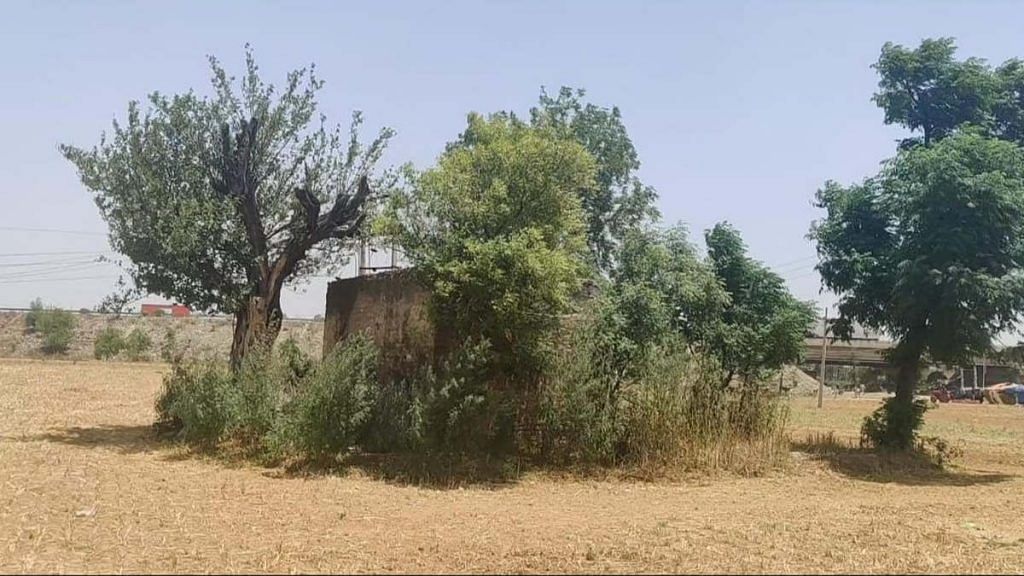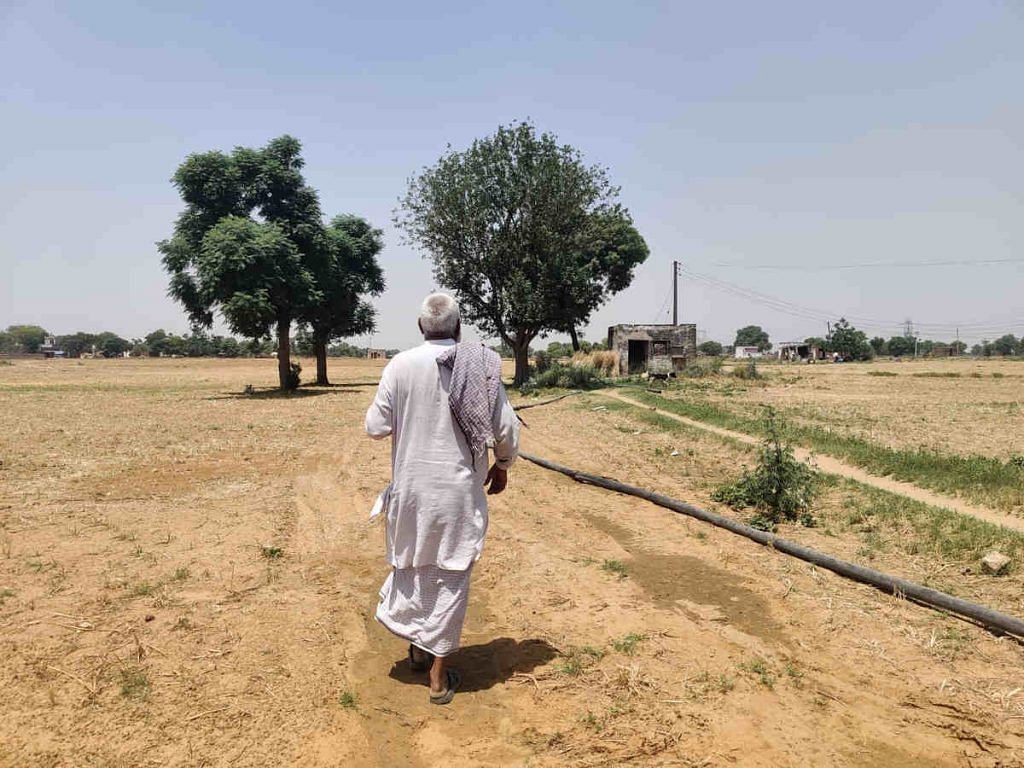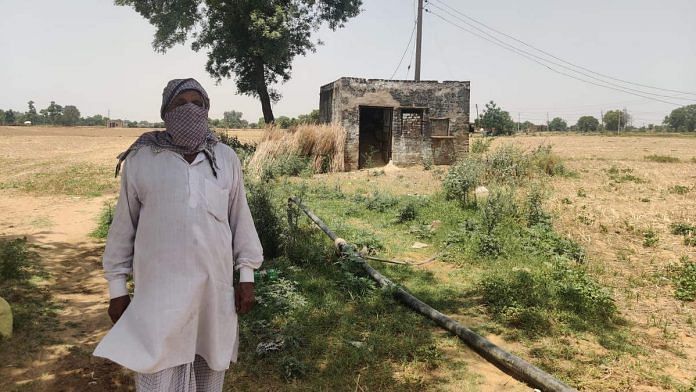Tauru: An 85-year-old from Dingerheri village doesn’t need prompting when it comes to recalling the gruesome night of 25 August, 2016. The memory is seared into him, and years of media appearances and court statements allow him to recount the events in clinical detail. He automatically wraps a cloth around his face before speaking, a habit ingrained in him to protect the identities of the victims.
Beneath the bright sunlight, his dusty field, with its concrete kothris (shelters), appears unremarkable. Yet, over seven years ago, this seemingly ordinary field in Dingerheri village of Tauri tehsil, in Haryana’s Nuh district, was the scene of a bloodbath. On a muggy August night, a gang of men armed with lathis and iron rods savagely attacked the octogenarian’s family as they slept.
Almost mechanically, he recounts the horrific toll. His son, Ibrahim, and daughter-in-law, Rashidan, were murdered. His granddaughters, one a minor, were gangraped. His grandsons, Naved and Parvez, his daughter, Ayesha, and her husband, Jafaruddin, were all grievously injured.
The attack took place just days before Bakr Eid, and the entire family had been in a celebratory mood. “These three kothris were built years ago,” he recalled. “In the summer, the family would sleep here, especially when festivities were approaching and relatives visited.”
Now, all these years later, the case has reached a conclusion. But it’s not a fully satisfying one for him and his family members.
Earlier this month, a special CBI court in Haryana sentenced four men to death for the murders and gangrapes based on forensic evidence, including DNA and fingerprint analysis. The court noted that “any lesser sentence would do grave injustice not only to the victims and their family members but to the collective conscience of the society”.
The four convicted men are Hemant Chauhan (alias Dharmu/Rahul/Dhirender), Ayaan Chauhan (alias Munna/Lucky), Vinay (alias Lambu/Tuli), and Jai Bhagwan (alias Saitu), all said to be members of the Bawaria Gang, also known as the Axle Gang.
Over 150 crimes, including gangrapes and dacoity, are attributed to the Axle Gang, known to operate on highways. Hemant and Vinay were also among the convicts in a 2017 gangrape case where two women were sexually assaulted at a factory in Gurugram’s Pataudi. Additionally, Axle Gang members have also been accused in the 2016 Bulandshahr gangrape case and in the 2017 Jewar gangrape and murder case.
However, while the family welcomes this development, they claim that justice has only been partially done.
In the same order where it found the four men guilty of double murder, gangrape and dacoity, a CBI court in Panchkula also acquitted six other accused on the grounds of insufficient evidence, investigative lapses, and inconsistent testimonies from victims and eyewitnesses.
“It can’t be the work of just four men,” argued Faruq, one of the other sons of the 85-year-old. “We had given them names of the other accused as well. Some of them were identified through the test identification parade, and others were identified in court.”
Public Prosecutor PK Srivastava, while speaking to ThePrint, lauded the court’s decision to convict the four accused but acknowledged that the CBI had failed to produce enough evidence against the others who were acquitted.
“These four men who have been convicted have committed a series of crimes and they have a criminal pattern,” Srivastava added.
Meanwhile, advocate Dr Mewa Singh, counsel for Hemant Chauhan, Ayaan Chauhan, and Jai Bhagwan, said he would file appeals in a higher court against the conviction and verdict.
“My clients have been falsely implicated in this case,” Singh told ThePrint. “Their names or identities hadn’t cropped up for a year since the crime.”
Also Read: Meo Muslims of Mewat — who they are & what is their history
What happened on 26 August 2016?
With Bakr Eid approaching, the 85-year-old’s entire family, including his 21-year-old granddaughter and her newborn baby, gathered in Dingerheri. With their small house overflowing, some family members had to make arrangements for the night elsewhere.
Standing near the site of the murderous assault and gangrape, he explained that he and some relatives decided to sleep at home, while others planned to stay on the farm.
He pointed towards two huts about 300 metres away, where he said his daughter Ayesha and her husband Jaffaruddin were sleeping on a cot outside. Inside the second kothri, his granddaughters, aged 16 and 21, were asleep. His grandsons, Naved and Parvez, around 10-12 years old, were also sleeping on a cot outside. His other son, Ibrahim, and daughter-in-law, Rashidan, had settled on a cot near the first kothri.
“My 21-year-old granddaughter had come home for Eid,” he said. “While she and her 16-year-old sister were sleeping inside the second kothri, they heard screams outside. They opened a little to see what was happening. Naved ran inside, followed by four or five men who barged into the room and demanded money and gold.”
According to the 85-year-old, his elder granddaughter tried to escape, but the men held her newborn infant upside down with a knife to his throat, forcing her to stop.
“These men dragged both girls to the first kothri and raped them,” he continued. “Before dragging them away, they forced the girls to remove their clothes. Ibrahim, Rashidan, Naved, Parvez, Jaffaruddin, and Ayesha witnessed this, but couldn’t help because they were tied down and injured.”

Investigation & 3 sets of arrests
The Dingerheri attack immediately caused a furore, with the case taking on a communal colour. In the Muslim-majority district of Nuh, rumours spread that the attackers targeted the family because of their religion, with some even claiming they were gau rakshaks (cow protectors).
Meanwhile, arrests came quickly. On 28 August 2016, Haryana police arrested four men—Sandeep, Amarjeet, Karamjeet, and Rahul Verma, all from the neighbouring Mohammadpur Ahir village, separated from Dingerheri by the Kundli-Manesar-Palwal Express Highway.
The Haryana police later filed a chargesheet in the case accusing all four of murder and gangrape.
However, according to court documents, the men were arrested solely on suspicion of consuming liquor near the crime scene on 24 August, hours before the incident. The arrests provoked an uproar among villagers, with allegations emerging that they were made only to appease public outcry.
As a result of this, the case was transferred to the CBI in December 2016 at the request of the state government.
The next break in the case came in October 2017, when the Haryana Police in October 2017 arrested three Axle Gang members— Hemant, Ayaan, and Vinay— in connection with a separate crime.
Subsequently, while in custody, the three allegedly confessed to a series of crimes in the past year, including the Dingaheri gangrape and double murder. Another Axle Gang member Jai Bhagwan was also arrested in another case the same month. The CBI then filed a supplementary chargesheet on 25 January 2018.
Then, in January 2020, the central agency filed another chargesheet against three others—Amit Yadav alias Sonu, Ravinder Yadav alias Fauji/Kalu, and Tejpal Yadav. Except for Tejpal Yadav, the other two are from Tauru itself.
Later, one accused, Amarjeet, absconded after being granted parole and was declared a “proclaimed offender” by the court. Another suspect, Hansraj, who was summoned by the court during trial, died by suicide in November 2021.
The convictions
On 10 April, the special CBI Court at Panchkula convicted four of the accused— Hemant Chauhan (30), Ayaan Chauhan (24), Vinay (36), and Jai Bhagwan (31)—for gangrape, double murder, and assault with intent to kill the remaining victims.
The court relied on several pieces of scientific evidence to arrive at its verdict. DNA matching the convicted accused was found on the victims’ salwar and a towel from the crime scene. Additionally, a Forensic Science Laboratory (CFSL) report confirmed that the knife recovered from the location was used by the accused to cut branches from a neem tree, which were then fashioned into weapons. Further, a latent fingerprint lifted from the scene matched one of the accused.
“(T)hey are not entitled to be shown any leniency in the matter of award of sentence inasmuch as they not only killed a Muslim couple by hitting them with sticks on their heads but also gangraped a minor girl of 16 years and a married woman of 21 years in a most brutal, cruel and ruthless manner,” read the order.
The death sentence against the four in this “rarest of the rare” case was pronounced on 4 May.
But for the family, the convictions are bittersweet. “Some of them have been punished and we are glad that they have been given the death penalty,” said the 85-year-old. “But it’s not just them. Only four men didn’t do this. The others are roaming scot-free”
The acquittals
In the same 10 April order in which it convicted four accused, the CBI court also acquitted six due to lack of evidence, lapses in the investigation, and “inconsistent” victim and witness statements.
Special Judge Rajeev Goyal pointed out that neither the police nor the CBI adequately investigated how the accused from the three separate sets of arrests—in 2016, 2017, and 2020—were connected. He noted that none of the accused across the three groups implicated each other in their statements, and no evidence suggested a coordinated plan to commit the crime.
Even the supplementary chargesheet against the convicted accused, obtained by ThePrint, mentions no “incriminating” evidence against the first four men arrested from the neighbouring village by the Haryana Police in 2016.
Noting this, the court said in its order: “CBI had no guts to call a spade a spade.”
Judge Goyal also highlighted how the six acquitted men were arrested solely based on the statements of the victims and their family members, rather than forensic or any other substantive evidence, remarking on investigative oversights.

For instance, the investigating officer who filed the third chargesheet failed to gather evidence placing the accused at the crime scene, the judge said. Additionally, fingerprints recovered at the scene were not matched with the four accused named in the third chargesheet.
The court also raised concerns about inconsistencies in the statements of the gangrape victims. Judge Goyal noted that both victims initially described 4-5 attackers, but this number grew as their statements progressed. He further observed that the victims claimed to have been raped by four people “until they lost consciousness,” followed by assaults from additional attackers. However, the court found no evidence to support the claim of lost consciousness.
On the statements made against the now-acquitted accused by the gangrape victims, as well as Parvez and Naved, both children at the time of the attack, the court said they were of “impressionable age and, therefore, could be influenced easily”.
While prosecution witnesses claimed Rashidan, before her death, identified the assailants by name, including Amarjeet, Karamjeet, Sandeep, Rahul, Hansraj, and Ravinder Fauji, the court relied on a medical opinion. This opinion stated that Rashidan’s injuries would have rendered her incapable of being in “sound mind” or having the “capability to hold the memory”. Consequently, her statement was deemed inadmissible as legal oral testimony.
The court also rejected the prosecution’s evidence from the test identification parade. They reasoned that the accused were never in “muffled” faces while they were in custody, raising the possibility that the victims might have seen them post their arrest.
Judge Goyal further speculated that past arguments between the accused from the neighbouring village and the victims’ family over payments at Ibrahim’s tea stall “could also be a reason for their false implication in the present case”. He also mentioned the prosecution’s statement that Ibrahim was forced to close his tea stall after the accused from the neighbouring villages threatened him with “dire consequences” if he demanded payment.
“Petty communal politics at the behest of vested interests” had reared their head since the incident, the judge observed in the context of the arrests of the first four men in 2016.
However, Supreme Court advocate Mir Akhtar Hussain, the counsel for the victims’ family, contested the grounds for acquittal.
“The statements of the gangrape victims were recorded soon after the assault. Moreover, the girls were taken to a different room and the murders took place outside. It is as if this order is only for the gangrape and not the double murders,” he said. “The point that the number of the accused increased during the investigation and trial is bizarre. How is it humanly possible for four people to commit a double murder, rape two people, assault four others, commit dacoity, and then run away?”
‘So much has been lost’
The octogenarian and other family members are struggling to come to terms with the verdict. They maintain that the six acquitted accused were let off due to lapses in the investigation. They are also upset that their eyewitness statements have not been given enough weight.
“The girls were raped in a room by the four men. What about those who went outside and killed my son and daughter-in-law and assaulted the others? They are now roaming free,” he said. “We, including the girls who were subjected to the gangrape, had given statements and recognised the others as well. That wasn’t taken into consideration?”
Sitting on a cot, wiping sweat from his forehead, he gestured towards the kothris, blackened with neglect and in a state of disrepair.
“A lot has been lost in these years. The court said there’s no evidence to suggest the accused acted together. Whose fault is that? We waited for so long for justice, he said.
Apart from the devastating losses they suffered, he added that the family has also paid a social cost in the aftermath of the attack.
“My granddaughter’s husband wanted to leave her after the assault. We had to pay a lot of dowry to get the minor (now adult) married,” he said.
While the kothri where the gangrapes took place is kept under lock and key, the other one where the children were sleeping is now used as a storage room for grains.
(Edited Asavari Singh)



